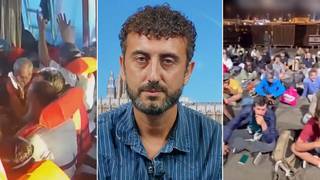
By Amy Goodman with Denis Moynihan
They called it “Operation Sea Breeze.” Despite the pleasant-sounding name, Israel’s violent commando raid on a flotilla of humanitarian aid ships, which left nine civilians dead, has sparked international outrage. The raid occurred in the early-morning hours of May 31, as the six vessels laden with humanitarian aid were still in international waters, bound for Gaza, where 1.5 million Palestinian residents are in their third year of an Israeli-imposed blockade. Israel has, from the outset, sought to limit the debate over the attack, and to control the images.
Israeli military boats and helicopters raided the vessels and took control of the flotilla. Nine of the activists on board the largest vessel, the Mavi Marmara, were killed at close range by Israeli commandos firing live ammunition. Nineteen-year-old U.S. citizen Furkan Dogan was shot once in the chest and four times in the head. Israel commandeered the six vessels and arrested the roughly 700 activists and journalists, hauled them to the Israeli port of Ashdod and kept them out of meaningful communication with family, press and lawyers for days. The Israeli government confiscated every recording and communication device it could find—devices containing almost all the recorded evidence of the raid—thus allowing the state to control what the world learned about the assault. The Israelis selected, edited and released footage they wanted the world to see.
Four days after their capture, most of the detainees were deported by the Israeli government, well after the story had been framed.
I caught up with two veteran journalists who were covering the Gaza Freedom Flotilla for Australia’s Sydney Morning Herald, chief correspondent Paul McGeough and his photographer, Kate Geraghty. They were in Istanbul, where they had been deported from Israel. They had spent time on most of the ships of the flotilla, but were aboard the smaller, U.S.-flagged Challenger 1 when the raid occurred.
Geraghty described how she was shot with a Taser: “I was photographing Israeli commandos coming up a ladder. There was a white flash, this thing hit my arm. I was thrown a meter and a half. It hurt, and I immediately became sick, began throwing up.” She yelled that she and McGeough were from The Sydney Morning Herald, and one of the commandos responded, in English with an Australian accent, “We know you’re from the Herald.” Despite her breadth of experience covering conflict zones around the world, she found her maltreatment by the Israelis “more personal. They knew who we were, they stole my gear, they falsely imprisoned us when we were in international waters covering a legitimate story.”
I pointed out to McGeough the Rasmussen poll that found 49 percent of U.S. voters believe pro-Palestinian activists on the aid ships are to blame for what happened. He replied, “If ordinary Americans had seen below deck, the men with zip ties on their wrists, on their knees for hours, denied permission to go to the toilet, forced to soil their pants, women pleading to be able to give drinks to men, that may have changed their sense of what happened on the ships.”
When journalists are free to function, they can report the truth. The Israeli military has been forced to retract its claim that passengers aboard the flotilla were agents of al-Qaida. An Israel Defense Forces press release sent out two days after the assault says approximately 40 flotilla passengers “are mercenaries belonging to the Al Qaeda terror organization.” The independent journalist Max Blumenthal says both he and an Israeli colleague asked the Israeli military press office to substantiate its claim. No evidence was provided, and one day later the press release was modified. The original headline was changed from “Attackers of the IDF Soldiers Found to be Al Qaeda Mercenaries” to “Attackers of the IDF Soldiers Found Without Identification Papers.”
McGeough told me: “This is what we do: We embed with U.S. forces in Iraq, and with Australian forces in Afghanistan. I’ve spoken to Israeli officials, and in the West Bank and Gaza I’ve spoken to Hamas, to young would-be suicide bombers, because that’s how we get stories. If you just tell one side of the story then people can’t have a sensible view of a dynamic conflict, in order to understand how it might be resolved.”
McGeough and Geraghty and all the other journalists have yet to receive their laptops, cameras, videos, photos and other possessions from the Israelis. And Israel has said it will not accept an independent investigation of its raid. Israel’s continued attempts to hide the truth only further imperil the security of Israelis, Palestinians and all those working for a just peace in the Middle East.
Amy Goodman is the host of “Democracy Now!,” an independent, daily global TV/radio news hour airing on more than 950 stations in the United States and around the world. She is the author of “Breaking the Sound Barrier,” recently released in paperback and now a New York Times best-seller.
© 2011 Amy Goodman











Media Options